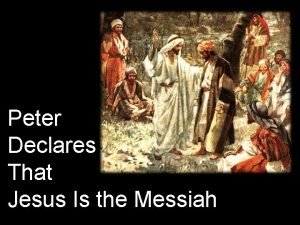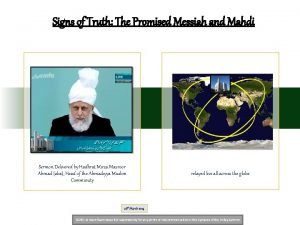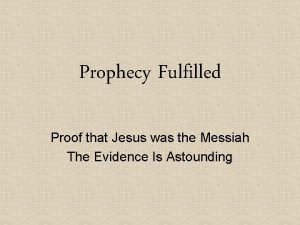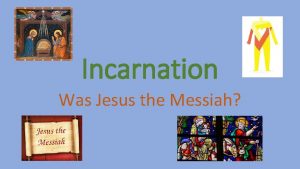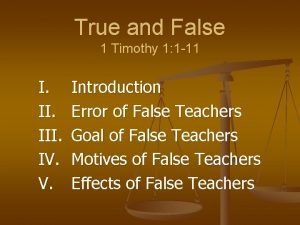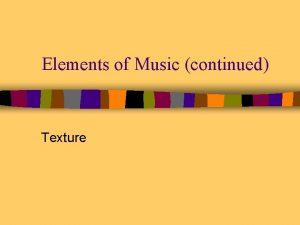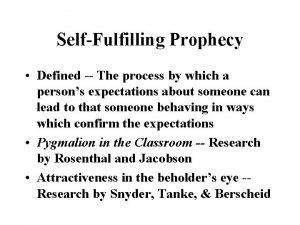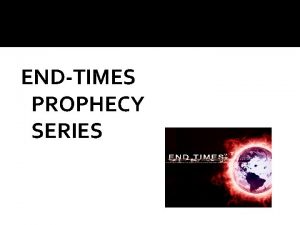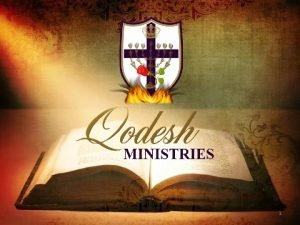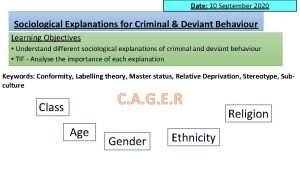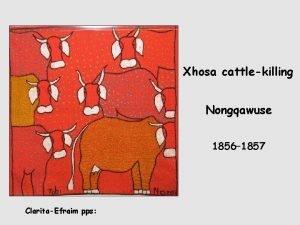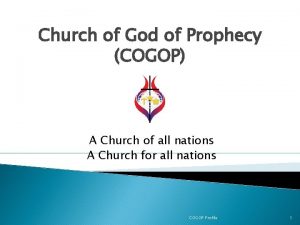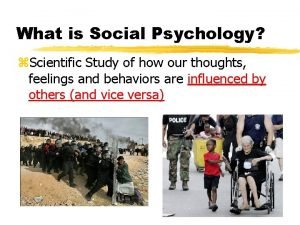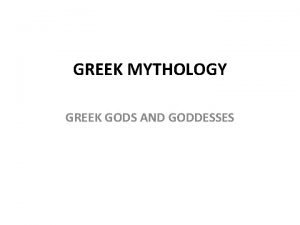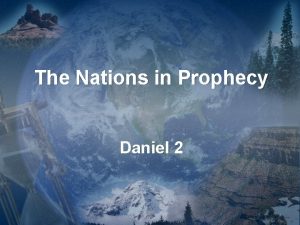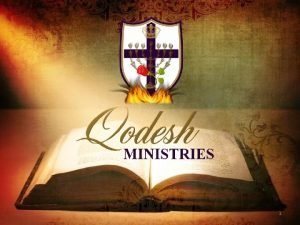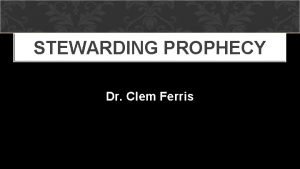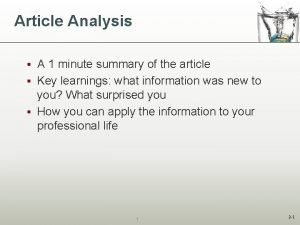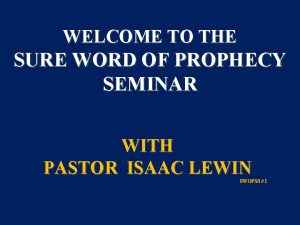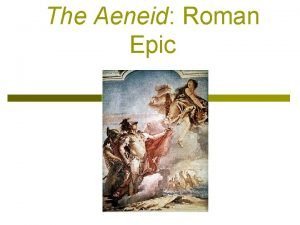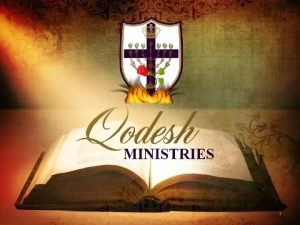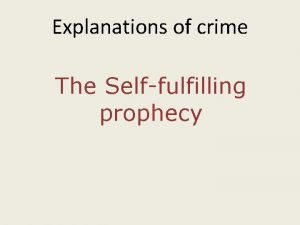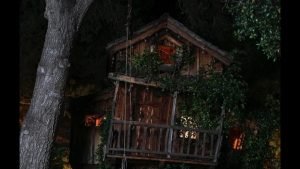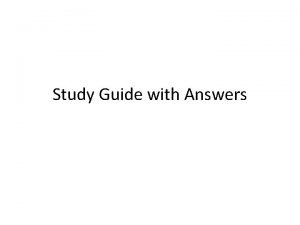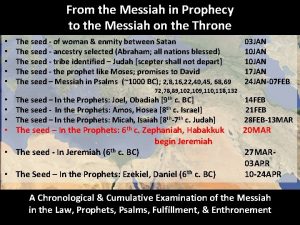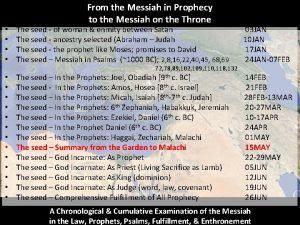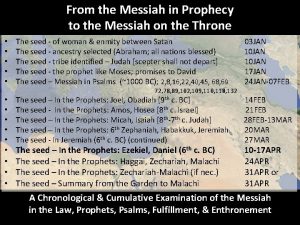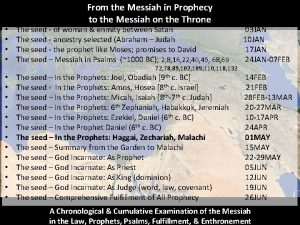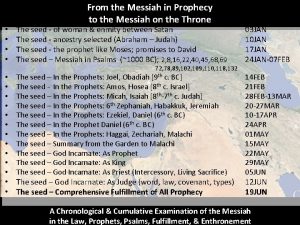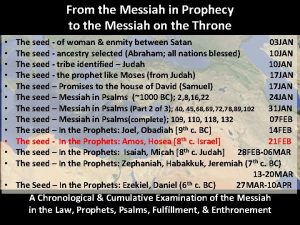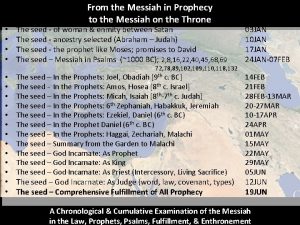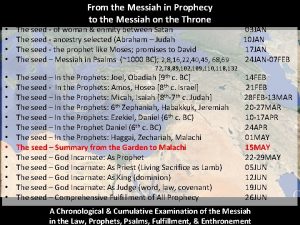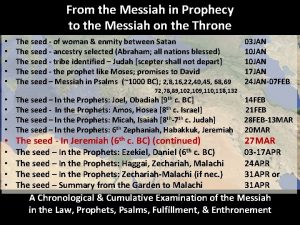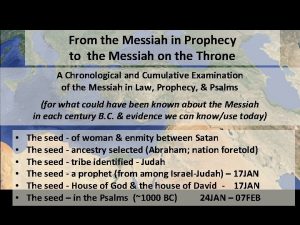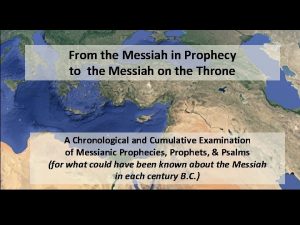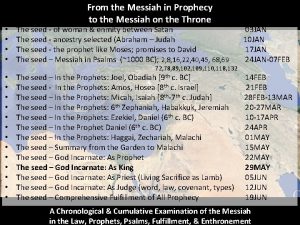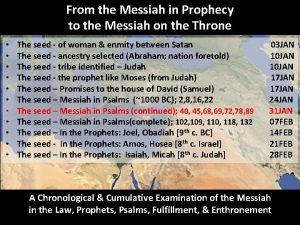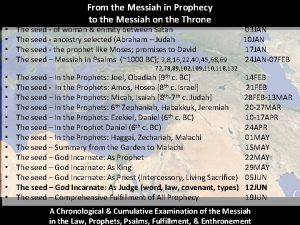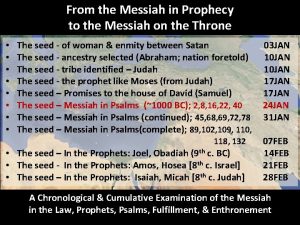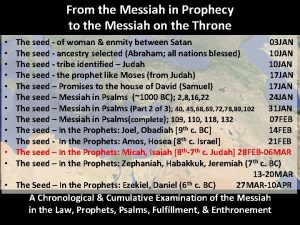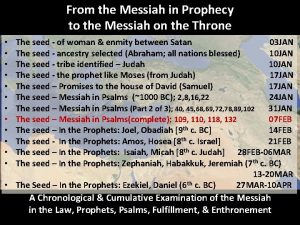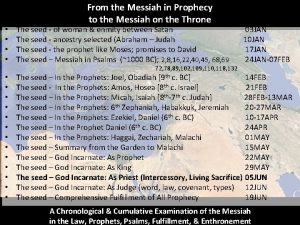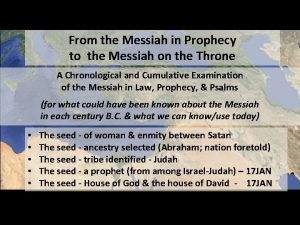From the Messiah in Prophecy to the Messiah





































- Slides: 37

• • From the Messiah in Prophecy to the Messiah on the Throne The seed - of woman & enmity between Satan The seed - ancestry selected (Abraham – Judah The seed - the prophet like Moses; promises to David The seed – Messiah in Psalms (~1000 BC); 2, 8, 16, 22, 40, 45, 68, 69 03 JAN 10 JAN 17 JAN 24 JAN-07 FEB The seed – In the Prophets: Joel, Obadiah [9 th c. BC] The seed - In the Prophets: Amos, Hosea [8 th c. Israel] The seed – In the Prophets: Micah, Isaiah [8 th-7 th c. Judah] The seed – In the Prophets: 6 th Zephaniah, Habakkuk, Jeremiah The seed – In the Prophets: Ezekiel, Daniel (6 th c. BC) The seed – In the Prophets: Haggai, Zechariah, Malachi The seed – Summary from the Garden to Malachi The seed – God Incarnate: As Prophet The seed – God Incarnate: As Priest (Living Sacrifice as Lamb) The seed – God Incarnate: As King (dominion) The seed – God Incarnate: As Judge (word, law, covenant) The seed – Comprehensive Fulfillment of All Prophecy 14 FEB 21 FEB 28 FEB-13 MAR 20 -27 MAR 10 -17 APR 24 APR 01 MAY 15 MAY 22 MAY 29 MAY 05 JUN 12 JUN 19 JUN 72, 78, 89, 102, 109, 110, 118, 132 • • • • A Chronological & Cumulative Examination of the Messiah in the Law, Prophets, Psalms, Fulfillment, & Enthronement

Reminder: Deut 18: 15, 18 -19 Deu 18: 15, 18 -19 "The LORD your God will raise up for you a prophet like me from among you, from your countrymen, you shall listen to him. 18 'I will raise up a prophet from among their countrymen like you, and I will put My words in his mouth, and he shall speak to them all that I command him. 19 'And it shall come about that whoever will not listen to My words which he shall speak in My name, I Myself will require it of him. [an accounting] The coming prophet would be: 1. An Israelite ‘from among your brethren’ [from Judah – Gen 49] 2. “like” Moses • Authorized by God to declare His word w/ God’s authority • He would enjoy intimate ‘face to face’ fellowship w/ God • He would perform miracles in public before the nations (like Moses); not in private as did Elijah/Elisha for the most part; Deut 34: 10 -12 • He would be a lawgiver, judge, and mediator, serving intercessorily for the people. • He would be a deliverer/rescuer of the people, delivering from bondage.

The Seed as THE Prophet – Jn 6: 14 -15 When therefore the people saw the sign which he did, they said, This is of a truth the prophet that cometh into the world. Jesus therefore perceiving that they were about to come and take him by force, to make him king, withdrew again into the mountain himself alone. [repeated in 7: 40] • Intent to make him king reveals either an understanding of the messiah as prophet-king, or the ignorance of the people of what ‘the prophet’ was to ‘look like’; what His work and purpose were to be; the KIND of KING He was to be. [Jn 1: 15 -27]. • Philip, finding Nathaniel, announced finding the one Moses wrote about in the Law, and about whom the prophets also wrote (Jn 1: 45) • The Samaritan woman from Sychar at Jacob’s well perceived/concluded that Jesus was “the prophet” who was to come (Jn 4: 19, 29) • Certain 1 st century Jews (& Samaritans) apparently expected “the prophet who was to come” as one who would work miracles, and such a one was to become a physical king. Knowledge of the Messiah was neither accurately taught nor understood by priests & people. [Isaiah 35: 1 – spiritual desert/void => Jn 1: 15 -27]

Defining a Prophet • Prophets were ones whom God ‘raised up’ in times of spiritual and moral repression and decay (spiritual void/deserts), and in whose mouths He put His Word, through whom He spoke, and on whom He placed His spirit, and sent to His people as His spokesperson to speak of past, present, and future. Predominantly prophets were proclaimers! • Their roles were to speak His Word to recall/remind of the past, to condemn sin, exhort repentance and warn of consequences, convict ungodliness, and to speak to the future of God’s people and His plan; “declaring the end from the beginning, and from ancient times things that are not yet done…” Isaiah 46: 10 • As prophet, the Messiah performed all of these and fulfilled every detail of which Moses (& God) spoke regarding the prophet God would raise up “like unto me”. • Because foretelling the future is viewed by humans as a powerful sign, and the sure sign of a prophet being from God, it is in this role that we will focus our study of the Seed of Woman as the Promised Prophet.

Foretelling His Resurrection – Jn 2: 19 Jn 2: 18 -19 The Jews therefore answered and said unto him, What sign showest thou unto us, seeing that thou doest these things? Jesus answered and said unto them, Destroy this temple, and in three days I will raise it up. • Destroy = λυ σατε [lusate] = loosen, untie, unbind, put off. • this temple = το ν ναο ν [ton naon] = dwelling • I will raise it up = ε γερω αυ το ν [hegeiro auton] = I myself will cause to rise, arouse from sleep or death, raise up. • Lit: Put off this dwelling and in three days I myself will cause it to rise up [arouse it from death/sleep]. • Jn 2: 22 Then when He was raised from the dead, His disciples recalled that He said this to them. And they believed the Scripture, even the Word that Jesus spoke. • Mk 14: 58 We heard Him saying, I will throw down [καταλυσω = demolish] this temple made with hands [χειροποιητον = of human construction] , and through three days I will build another not made with hands [ἄλλον α χειροποι ητον οι κοδομη σω = construct a different one].

Eyewitnesses to His Prophecy & to His Actual Resurrection Event • Jn 2: 22 Then when He was raised from the dead, His disciples recalled that He said this to them. And they believed the Scripture, even the Word that Jesus spoke. • Mk 14: 58 [His opponents/false accusers] We heard Him saying, I will throw down [καταλυσω = demolish] this temple made with hands [χειροποιητον = of human construction] , and through three days I will build another not made with hands [ἄλλον α χειροποι ητον οι κοδομη σω = construct a different one]. • Mt 28: 4 – the cohort at the tomb upon the appearance of the angel and his rolling away the stone and seeing the empty tomb upon regaining consciousness. • Mt 28: 11 – the eyewitnesses of the guard reported to the chief priests what they saw happen; the chief priests received eyewitness accounting. • Mt 28: 12 – the elders are gathered and informed w/ some of the guard present (large sum of hush money dispensed to the guards) • Jn 20: 9 – the disciples as yet did not understand the scripture, that He must rise again from the dead

Matt 24: 1 -35 [events from ~35 A. D. leading up to 70 A. D. ; signs of the end of the Jewish Dispensation, and the Destruction of Jerusalem] • Of the prophecies of Jesus, other than His own resurrection, few are so interesting or so striking as those which relate to the calamities that befell the Jewish nation between 35 -70 AD, and all that led to the destruction of Jerusalem and its Temple. • Jesus’ prophecies relative to these events are in Mt. 24, Mk 13 Lk 21. Josephus’ Antiquities of the Jews, records the historical facts which verify these prophecies as conclusive and incontrovertible proofs of His divinity as they occur precisely as stated and in the exact order stated by Jesus. • Mt 24: 3 And as he sat on the mount of Olives, the disciples came unto him privately, saying, 1. Tell us, when shall these things be? and 2. What shall be the sign of thy coming and of the end of the world? • Two questions are presented and Jesus answers both; the division between the two answers occurs between v. 35 and v. 36 of Mt 24 [language, verbiage and tenses shift AFTER v. 35]; after v. 35 addresses His coming.

Matt 24: 4 -5 = False Messiahs "Take heed, that no man deceive you; for many shall come in my name, saying, I am Christ, and shall deceive many. " • Within one year after our Lord's ascension, rose Dositheus the Samaritan, who had the boldness to assert that he was the Messiah, of whom Moses prophesied; while his disciple Simon Magus deluded multitudes into a belief that he, himself, was the " GREAT POWER OF GOD. " • About three years afterwards another Samaritan impostor appeared, and declared that he would show the people the sacred utensils, said to have been deposited by Moses, in mount Gerizim. Induced by an idea that the Messiah, their great deliverer, was now come, an armed multitude assembled under him, but Pilate speedily defeated them, and slew their chief. • While Cuspius Fadus was procurator in Judea (44 -46 AD), another deceiver arose, whose name was Theudas. This man actually succeeded so far as to persuade a very great multitude to take their effects and follow him to Jordan, assuring them, that the river would divide at his command. Fadus, however, pursued with a troop of horse, and slew many of them, and among the rest the impostor himself, whose head was cut off and carried to Jerusalem.

Matt 24: 4 -5 = False Messiahs • Under the government of Felix (procurator, 52 -58 AD), deceivers rose up daily in Judea, and persuaded the people to follow them into the wilderness, assuring them that they should there behold conspicuous signs and wonders performed by the ALMIGHTY. Of these Felix, from time to time, apprehended many, and put them to death. • About A. D. 55 arose Felix the celebrated Egyptian impostor, who collected thirty-thousand followers, and persuaded them to accompany him to the Mount of Olives, telling, them that from there they should see the walls of Jerusalem fall down at his command, as, a prelude to the capture of the Roman garrison, and to their obtaining the sovereignty of the city. The Roman governor, however, apprehending this to be the beginning of revolt, immediately attacked them, slew four hundred of them, and dispersed the rest but the Egyptian effected his escape. • In the time of Porcius Festus (A. D. 60, ) another distinguished impostor seduced the people, by promising them deliverance from the Roman yoke, if they would follow him into the wilderness ; but Festus sent out an armed force which speedily destroyed both the deceiver and his followers. In short, impostors to a divine commission continually and fatally deceived the people.

Matt 24: 4 -5 = False Christs • Dositheus may have been the only one who assumed the name of Messiah, but the material and unspiritual expectations of the Jews were directed to a Messiah who should merely deliver them from the Roman yoke, and "restore the kingdom to Jerusalem; and such were the pretensions of these deceivers, to pretend to deliver to the people exactly what they wanted. • Reminder: "I am come in my Father's name, and ye receive me not ; if another shall come in his own name, him ye will receive. " " If they shall say unto you, 'Behold he is in the desert!" go not forth. They will show (or pretend to show) great signs and wonders. Mt 24: 23 -26 [v. 5 is immediately after Christ’s time on earth; vv. 23 -26 refer to the period leading up to just before the siege of Jerusalem] • “And ye shall hear of wars, and rumors of wars ; see that ye be not troubled : for all these things must come to pass, but the end is not yet, for nation shall rise up against nation and kingdom against kingdom, and great earthquakes shall be in divers places, and famines, and pestilences : all these are the beginnings of sorrows. " -- Matt. 24: 6 -7

Matt 24: 6 -7 Wars, rumors, nations & kingdoms fighting, great earthquakes, famines, pestilences “And ye shall hear of wars, and rumors of wars ; see that ye be not troubled : for all these things must come to pass, but the end is not yet, for nation shall rise up against nation and kingdom against kingdom, and great earthquakes shall be in divers places, and famines, and pestilences : all these are the beginnings of sorrows. " • About three years after the death of Christ, a war broke out between Herod and Aretas, king of Arabia Petraea, in which the army of the former was cut off. This was kingdom rising against kingdom • About this time, the emperor Caligula (37 -41 AD), having ordered his statue to be placed in the temple of Jerusalem, and the Jews having persisted to refuse him, the whole nation were so much alarmed, by the mere apprehension of war, that they neglected even to till their lands. • About this period (~40 -44 AD) a great number of Jews, on account of a pestilence which raged at Babylon, removed from that city to Seleucia, where the Greeks and Syrians rose against them, and destroyed more than five myriads! "The extent of this slaughter (says Josephus) had no parallel in any former period of their history.

Matt 24: 6 -7 Wars, rumors, nations & kingdoms fighting, great earthquakes, famines, pestilences “And ye shall hear of wars, and rumors of wars ; see that ye be not troubled : for all these things must come to pass, but the end is not yet, for nation shall rise up against nation and kingdom against kingdom, and great earthquakes shall be in divers places, and famines, and pestilences : all these are the beginnings of sorrows. " • About five years after this dreadful massacre (~45 -49 AD), there happened a severe contest between the Jews at Perea, and the Philadelphians, respecting the limits of a city called Mia, in which many of the former were slain. This was nation rising up against nation. • Four year afterwards (~49 -52 AD) , under Ventidius Cumanus (procurator Judea, 48 -52 AD), an indignity was offered to the Jews within the precincts of the temple, by a Roman soldier, which they violently resented; upon the approach of the Romans in great force, their terror was so excessive, and so disorderly and precipitated their flight, that not less than ten thousand Jews were trodden to death in the streets. Again, nation rising up against nation

Matt 24: 6 -7 Wars, rumors, nations & kingdoms fighting, great earthquakes, famines, pestilences “And ye shall hear of wars, and rumors of wars ; …for nation shall rise up against nation and kingdom against kingdom, and great earthquakes shall be in divers places, and famines, and pestilences … • Four years more had not elapsed (53 -56 AD), before the Jews made war against the Samaritans, and ravaged their country, the people of Samaria had murdered a Galilean who was going up to Jerusalem to keep the Passover, and the Jews thus revenged it. At Caesarea, the Jews having had a sharp contention with the Syrians for the government of the city, an appeal was made to who decreed it to the Syrians. This event laid the foundation of a most cruel and sanguinary contest between the two nations. The Jews, mortified by disappointment, and inflamed by jealousy, rose against the Syrians, who successfully repelled them. In the city of Caesarea alone upwards of twenty thousand Jews were slain. • destructive rage spread wherever Jew and Syrians dwelt together; throughout every city, town, and village, mutual animosity and slaughter prevailed. At Damascus, Tyre, Ascalon, Gadara, and Scythopolis, the carnage was dreadful. At the first of these cities, ten thousand Jews were slain in one hour, and at Scythopolis thirteen thousand treacherously in one night.

Matt 24: 6 -7 Wars, rumors, nations & kingdoms fighting, great earthquakes, famines, pestilences “And ye shall hear of wars, and rumors of wars ; …for nation shall rise up against nation and kingdom against kingdom, and great earthquakes shall be in divers places, and famines, and pestilences … • At Alexandria the Jews, aggrieved by the oppressions of the Romans, rose against them; the Romans, gaining the ascendancy, slew of that nation fifty thousand persons, sparing neither infants nor the aged. • After this, at the siege of Jopata, not less than forty thousand Jews perished. While these destructive contests prevailed in the East, the western parts of the Roman empire were rent by the fierce contentions of Galba, Otho, and Vertellis; of which three emperors together with Nero died a violent death within the short space of eighteen months (68 -69 AD). • Finally, the whole nation of the Jews took up arms against the Romans, king Agrippa, and provoked that dreadful war which, in a few years, deluged Judea in blood, and laid its capital in ruins (68 -70 AD Jerusalem … 72/73 AD compl. ) • The wars were of two kinds, within the period assigned, on those to whom the prophecy chiefly related, and was foretold by a carpenter’s son.

Matt 24: 6 -7 Wars, rumors, nations & kingdoms fighting, great earthquakes, famines, pestilences “And ye shall hear of wars, and rumors of wars ; …for nation shall rise up against nation and kingdom against kingdom, and great earthquakes shall be in divers places, and famines, and pestilences … • In the reign of Claudius there was one at Rome, and another at Apamea in Syria, where many of the Jews resided. The earthquake at the latter place was so destructive, that the emperor, in order to relieve the distresses of the inhabitants, remitted its tribute for five years. • Both these earthquakes are recorded by Tacitus. • There was one also, in the same reign in Crete. This is mentioned by Philostratus, in his Life of Apollonius, who says, that 'there were others at Smyrna, Miletus, Chios, and Samos ; in all which places Jews had settled. " • In the reign of Nero there was an earthquake at Laodicea. Tacitus records this also. It is likewise mentioned by Eusebius and Orosius, who add that Hieropolis and Colose, as well as Laodicea, were overthrown by an earthquake.

Matt 24: 6 -7 Wars, rumors, nations & kingdoms fighting, great earthquakes, famines, pestilences “And ye shall hear of wars, and rumors of wars ; …for nation shall rise up against nation and kingdom against kingdom, and great earthquakes shall be in divers places, and famines, and pestilences … • There was also one in Campania in this reign (of this both Tacitus and Seneca speak ; ) and another at Rome in the reign of Galba, recorded by Suetonius to all which may be added those which happened on that dreadful night when the Idumeans were excluded from Jerusalem, a short time before the siege commenced. • "A heavy storm (says Josephus) burst on them during the night violent winds arose, accompanied with the most excessive rains, with constant lightnings, most tremendous thunderings, and with dreadful roarings of earthquakes. It seemed (continues he) as if the system of the world had been confounded for the destruction of mankind ; and one might well conjecture that these were signs of no common events. "

Matt 24: 6 -7 Wars, rumors, nations & kingdoms fighting, great earthquakes, famines, pestilences “And ye shall hear of wars, and rumors of wars ; …for nation shall rise up against nation and kingdom against kingdom, and great earthquakes shall be in divers places, and famines, and pestilences … • Of these the principal was that which Agabus foretold would happen in the days of Claudius, as related in the Acts of the Apostles. It begun in the fourth year of his reign, and was of long continuance. It extended through Greece, and even into Italy, but was felt most severely in Judea, and especially at Jerusalem, where many perished for want of bread. • This famine is recorded by Josephus also, who relates that "an assaron of corn was sold for five drachmae" (i. e. about 3 1/2 pints for 3 s. 3 d. ) It is likewise noticed by Eusebius and Orosius. To alleviate this terrible calamity, Helena, queen of Adiabena, who was at that time in Jerusalem, ordered large supplies of grain to be sent from Alexandria; and Izates, her son, consigned vast sums to the governors of Jerusalem, to be applied to the relief of the more indigent sufferers.

Matt 24: 6 -7 Wars, rumors, nations & kingdoms fighting, great earthquakes, famines, pestilences “And ye shall hear of wars, and rumors of wars ; …for nation shall rise up against nation and kingdom against kingdom, and great earthquakes shall be in divers places, and famines, and pestilences … • The Gentile Christian converts residing in foreign countries, also sent, at the hands of Paul, liberal contributions, to relieve the distresses of their Jewish brethren. (I Cor. 16: 3. ) • Dion Cassius relates that there was likewise a famine in the first year of Claudius which prevailed at Rome, and in other parts of Italy; and, in the eleventh year of the same emperor, there was another, mentioned by Eusebius. • To these may be added those that afflicted the inhabitants of several of the cities of Galilee and Judea, which were besieged and taken, previously to the investment of Jerusalem, where the climax of national misery, arising from this and every other cause, was so awfully completed.

Matt 24: 6 -7 Wars, rumors, nations & kingdoms fighting, great earthquakes, famines, pestilences “And ye shall hear of wars, and rumors of wars ; …for nation shall rise up against nation and kingdom against kingdom, and great earthquakes shall be in divers places, and famines, and pestilences … • Our Lord adds "pestilences" likewise. Pestilence treads upon the heels of famine; this terrible scourge accompanied the famines. History particularly distinguishes two instances of this calamity, which occurred before the commencement of the Jewish war. The first took place at Babylon about A. D. 40, and raged so alarmingly, that great multitudes of Jews fled from that city to Seleucia for safety. • The other happened at Rome A. D. 65, and carried off prodigious multitudes. Both Tacitus and Suetonius record that similar calamities prevailed during this period in various parts of the empire. After Jerusalem was surrounded by the army of Titus, pestilential diseases made their appearance to aggravate the miseries and deepen the horrors of the siege. They were partly occasioned by the immense multitudes which were crowded together in the city, partly by the putrid effluvia which arose from the unburied dead, and partly from spread of famine.

Lk 21: 9 -11 - …and there shall be terrors and great signs from heaven • Luk 21: 9 -11 And when ye shall hear of wars and tumults, be not terrified: for these things must needs come to pass first; but the end is not immediately. Then said he unto them, Nation shall rise against nation, and kingdom against kingdom; and there shall be great earthquakes, and in divers places famines and pestilences; and there shall be terrors and great signs from heaven. • "And fearful sights and great signs shall there be from heaven. " Josephus (and Tacitus) have collected the principle events of these, and introduce by a reflection on the strangeness of that infatuation which could induce his countrymen to give credit to impostors and unfounded reports while they disregarded the divine admonitions, confirmed, as he asserts they were, by the following extraordinary signs: • "A meteor, resembling a sword, hung over Jerusalem during one whole year. " This could not be a comet for it was stationary and was visible for twelve successive months. A sword too, though a fit emblem for destruction, but does not represent a comet or meteor.

Lk 21: 9 -11 - …and there shall be terrors and great signs from heaven • Luk 21: 9 -11 And when ye shall hear of wars and tumults, be not terrified: for these things must needs come to pass first; but the end is not immediately. Then said he unto them, Nation shall rise against nation, and kingdom against kingdom; and there shall be great earthquakes, and in divers places famines and pestilences; and there shall be terrors and great signs from heaven. • "On the eighth of the month Zanthicus, (before the feast of unleavened bread) at the ninth hour of the night, there shone round about the altar, and the circumjacent buildings of the temple, a light equal to the brightness of the day, which continued for the space of half an hour. " • This could not be the effect of lightning, nor of a vivid aurora borealis, for it was confined to a particular area and the light shone un-intermittently for thirty minutes.

Lk 21: 9 -11 - …and there shall be terrors and great signs from heaven • Luk 21: 9 -11 And when ye shall hear of wars and tumults, be not terrified: for these things must needs come to pass first; but the end is not immediately. Then said he unto them, Nation shall rise against nation, and kingdom against kingdom; and there shall be great earthquakes, and in divers places famines and pestilences; and there shall be terrors and great signs from heaven. • “As the High Priest was/were leading a heifer to the altar to be sacrificed, she brought forth a lamb, in the midst of the temple. " Such is the strange account given by the historian. • The circumstances of the prodigy are remarkable. It did not occur in an obscure part of the city, but in the temple ; not at an ordinary time, but at the passover, the season of our LORD'S crucifixion in the presence, not of the common merely, but of the High Priests and their attendants, and when they were leading the sacrifice to the altar.

Lk 21: 9 -11 - …and there shall be terrors and great signs from heaven • Luk 21: 9 -11 And when ye shall hear of wars and tumults, be not terrified: for these things must needs come to pass first; but the end is not immediately. Then said he unto them, Nation shall rise against nation, and kingdom against kingdom; and there shall be great earthquakes, and in divers places famines and pestilences; and there shall be terrors and great signs from heaven. • “About the sixth hour of the night (0000), the eastern gate of the temple was seen to open without human assistance. " When the guards informed the Curator of this event, he sent men to assist them in shutting it, who with great difficulty succeeded. • This gate 'Was of solid brass, and required twenty men to close it every evening. It could not have been opened by a "strong gust of wind, " or a slight earthquake; " for Josephus says, it was secured by iron bolts and bars, which were let down into a large threshold; consisting of one entire stone. "

Lk 21: 9 -11 - …and there shall be terrors and great signs from heaven • Luk 21: 9 -11 And when ye shall hear of wars and tumults, be not terrified: for these things must needs come to pass first; but the end is not immediately. Then said he unto them, Nation shall rise against nation, and kingdom against kingdom; and there shall be great earthquakes, and in divers places famines and pestilences; and there shall be terrors and great signs from heaven. • “Soon after the feast of the Passover, in various parts of the country, before the setting of the sun, chariots and armed men were seen in the air, passing round about Jerusalem. " • Neither could this portentous spectacle be occasioned by the aurora borealis, for it occurred before the setting of the sun; nor merely the fancy of a few villagers, gazing at the heavens, for it was seen in various parts of the country.

Lk 21: 9 -11 - …and there shall be terrors and great signs from heaven • Luk 21: 9 -11 And when ye shall hear of wars and tumults, be not terrified: for these things must needs come to pass first; but the end is not immediately. Then said he unto them, Nation shall rise against nation, and kingdom against kingdom; and there shall be great earthquakes, and in divers places famines and pestilences; and there shall be terrors and great signs from heaven. • “At the subsequent feast of Pentecost, while the priests were going by night into the inner temple to perform their customary ministrations, they first felt, as they said, a shaking, accompanied by an indistinct murmuring, and afterwards voices as of a multitude, saying, in a distinct and earnest manner, "LET US DEPART HENCE. " • they heard, says Josephus, the voices as of a multitude, distinctly pronouncing the words "LET US DEPART HENCE. " • And accordingly, before the period for celebrating this feast returned, the Jewish war had commenced, and in the space of three years afterwards, Jerusalem was surrounded by the Roman army, the temple converted into a citadel, and its sacred courts streaming with the blood of human victims.

Lk 21: 9 -11 - …and there shall be terrors and great signs from heaven • Luk 21: 9 -11 And when ye shall hear of wars and tumults, be not terrified: for these things must needs come to pass first; but the end is not immediately. Then said he unto them, Nation shall rise against nation, and kingdom against kingdom; and there shall be great earthquakes, and in divers places famines and pestilences; and there shall be terrors and great signs from heaven. • As the last and most fearful omen, Josephus relates that one Jesus, the son of Ananus, a rustic of the lower class, during the Feast of Tabernacles, suddenly exclaimed in the temple, "A voice from the east a voice from the west -- a voice from the four winds- a voice against Jerusalem and the temple -- a voice against bridegrooms and brides -- a voice against the whole people !" • These words he incessantly proclaimed aloud both day and night, through all the streets of Jerusalem, for seven years and five months together, commencing at a time (A. D. 62) when the city was in a state of peace, and overflowing with prosperity, and terminating amidst the horrors of the siege. This disturber, having excited the attention of the magistracy, was brought before Albinus the Roman governor, who commanded that he should be scourged.

Lk 21: 9 -11 - …and there shall be terrors and great signs from heaven • Luk 21: 9 -11 And when ye shall hear of wars and tumults, be not terrified: for these things must needs come to pass first; but the end is not immediately. Then said he unto them, Nation shall rise against nation, and kingdom against kingdom; and there shall be great earthquakes, and in divers places famines and pestilences; and there shall be terrors and great signs from heaven. • But the severest stripes drew from him neither tears nor supplications. As he never thanked those who relieved, so neither did he complain of the injustice of those who struck him. And no other answer could the governor obtain to his interrogatories, but his usual denunciation of "Woe, woe to Jerusalem !" which he still continued to proclaim through the city, but especially during the festivals, when his manner became more earnest, and the tone of his voice louder. At length, on the commencement of the siege, he ascended the walls, and, in a more powerful voice than ever, exclaimed, "Woe, woe to this city, this temple, and this people !" And then, with a presentment of his own death, added, " Woe, woe to myself "' he had scarcely uttered these words when a stone from one of the Roman engines killed him on the spot.

Mt 24 & Lk 21 – betrayals by christians/even kin • Mat 24: 9 -10 Then shall they deliver you up unto tribulation, and shall kill you: and ye shall be hated of all the nations for my name's sake. And then shall many stumble, and shall deliver up one another, and shall hate one another. • Lk 21: 16 -17 But ye shall be delivered up even by parents, and brethren, and kinsfolk, and friends; and some of you shall they cause to be put to death. And ye shall be hated of all men for my name's sake. • "It was a war, " says Tertullian, "against the very name: to be a Christian was of itself crime enough. " And to the same effect is that expression of Pliny in his letter to Trajan : "I asked them whether they were Christians ; if they confessed it, I asked them a second a third time, threatening them with punishment, and those who persevered I commanded to be led away to death. " -- It is added, "Of all nations. " • Whatever animosity or dissensions might subsist between the Gentiles and the Jews on other points, they were at all times ready to unite and cooperate in the persecution of the humble followers of Him who came to be the LIGHT.

Mt 24 & Lk 21 – betrayals by christians/even kin • Mat 24: 9 -10 Then shall they deliver you up unto tribulation, and shall kill you: and ye shall be hated of all the nations for my name's sake. And then shall many stumble, and shall deliver up one another, and shall hate one another. • Lk 21: 16 -17 But ye shall be delivered up even by parents, and brethren, and kinsfolk, and friends; and some of you shall they cause to be put to death. And ye shall be hated of all men for my name's sake. • Concerning this fact, the following decisive testimony of Tacitus may suffice : speaking of the persecutions of the Christians under Nero, to which we have just alluded, he adds " several were seized, who confessed, and by their discovery a great multitude of others were convicted and barbarously executed. "

Mt 24: 14 – gospel preached to the WHOLE world • Mt 24: 14 And this gospel of the kingdom shall be preached in the whole world for a testimony unto all the nations; and then shall the end come. • Of the fulfillment of this prediction Paul addressed to the Christians at Rome, Corinth, Galatia, Ephesus, Philippi, Colosse, Thessalonica ; and Peter to such as resided in Pontus, Cappadocia, and Bithynia; for neither of these Apostles were living when the Jewish war commenced. • Paul, to the Romans, informs them that 'their faith was spoken of throughout the world; ' • to the Colossians he observes that the " Gospel had been preached to every creature under heaven. " • Clement, who claimed to be a fellow-laborer with the Apostle, relates of him that "he taught the whole world righteousness, travelling from the East westward to the borders of the ocean. " • Eusebius says that "the Apostles preached the Gospel in all the world, and that some of them passed beyond the bounds of the ocean, and visited the Britannic isles : " [9] so says Theodoret also.

Mt 24: 14 – gospel preached to the WHOLE world • Mt 24: 14 And this gospel of the kingdom shall be preached in the whole world for a testimony unto all the nations; and then shall the end come. • "It appears from the writers of the history of the church, that before the destruction of Jerusalem in 70 AD that the Gospel was not only preached in the Lesser Asia, and Greece, and Italy, but was likewise propagated as far northward as Scythia, as far southward as Ethiopia, as far eastward as Parthia and India, as far westward as Spain and Britain. " • Tacitus asserts that "the Christian religion, which arose in Judea, spread over many parts of the world, and extended to Rome itself, where the professors of it, as early as the time of Nero, amounted to a vast multitude, " insomuch that their numbers excited the jealousy of the government. • Panel carvings on 1 st century tombs in China are interpreted by one Chinese scholar as telling the story of Jesus (similar to European middle ages stained glass windows used to teach the illiterate). • Other scholars have rebuffed the idea that Christianity could have reached China in the first century though no scholar has a problem with the very probably fact that trade goods moved from Rome to China in a three to six month period (steel ingots imported from China by Rome).

Mt 24: 14 – gospel preached to the WHOLE world • Mt 24: 14 And this gospel of the kingdom shall be preached in the whole world for a testimony unto all the nations; and then shall the end come. • "Thus completely was fulfilled a prediction contrary to every conclusion that could have been grounded on moral probability, and to the accomplishment of which every kind of impediment was incessantly opposed. The reputed son of a carpenter instructed a few simple fishermen in a new dispensation destitute of worldly incentives, but full of self-denials, sacrifices, and sufferings, and tells them that in about forty years it should spread over all the world. It spreads accordingly and in defiance of the exasperated bigotry of the Jews, and of all the authority, power, and active opposition of the Gentiles, is established, within that period so stated by Jesus, and it spread within all the countries into which it penetrated. ” G. P. Holford, 1805. • During a time in which power was limited to wind, animal, or human, Jesus prophesied that the grandest city of its day, and the most impregnable, fortified, elaborate, and enriched temple facility on earth, would be leveled to the ground and the city slaughtered during the time of that generation to whom He spoke.

Mt 23 – YOUR house is left unto YOU desolate • Mt 23: 34 -38 Therefore, behold, I send unto you prophets, and wise men, and scribes: some of them shall ye kill and crucify; and some of them shall ye scourge in your synagogues, and persecute from city to city: that upon you may come all the righteous blood shed on the earth, from the blood of Abel the righteous unto the blood of Zachariah son of Barachiah, whom ye slew between the sanctuary and the altar. Verily I say unto you, All these things shall come upon this generation. O Jerusalem, that killeth the prophets, and stoneth them that are sent unto her! how often would I have gathered thy children together, even as a hen gathereth her chickens under her wings, and ye would not! Behold, your house is left unto you desolate.

Mt 22: 41 -46 = Ps 110: 1 = Heb 1: 13 -14 • Mat 22: 41 -46 Now while the Pharisees were gathered together, Jesus asked them a question, saying, What think ye of the Christ? whose son is he? They say unto him, The son of David (Ps 89). He saith unto them, How then doth David in the Spirit call him Lord, saying, The Lord said unto my Lord, Sit thou on my right hand, Till I put thine enemies underneath thy feet? If David then calleth him Lord, how is he his son? And no one was able to answer him a word, neither durst any man from that day forth ask him any more questions. (ASV) [Jesus confirms this verse spoke of Him] • Psa 110: 1 A Psalm of David. The LORD said unto my Lord, Sit thou at my right hand, until I make thine enemies thy footstool. • Heb 1: 13 -14 But of which of the angels hath he said at any time, Sit thou on my right hand, Till I make thine enemies the footstool of thy feet? Are they not all ministering spirits, sent forth to do service for the sake of them that shall inherit salvation? [NT writer relates that Ps 110: 1 is about the Messiah and none other, not even angels]

Moral State of Judea ~ 68 -70 AD • Vespasian, after proceeding as far as Jericho, returned to Caesarea, in order to make preparation for his grand attempt against Jerusalem. While he was thus employed, he received intelligence of the death of Nero ; whereupon, not knowing what the will of the future emperor might be, he prudently resolved to suspend, for the present, the execution of his design. • Thus the Almighty gave the Jews a second respite, which continued nearly two years ; but they repented not of their crimes, neither were they in the least degree reclaimed, but rather proceeded to acts of still greater enormity. The flame of civil dissension again burst out and, With more dreadful fury. • In the heart of Jerusalem two factions, contended for the sovereignty, raged a against each other with rancorous and destructive animosity. A division of one of these factions having been excluded from the city (vide page 26, ) forcibly entered it during the night. Athirst for blood, and inflamed by revenge, they spared neither age, sex, nor infancy ; and the morning beheld eight thousand five hundred dead bodies lying in the streets of the holy city.

Moral State of Jews in Jerusalem ~ 68 -70 AD: Gang Warfare • They plundered every house, and having found the chief priests Anaius and Jesus, not only slew them, but, insulting their bodies, cast them forth unburied. They slaughtered the common people as unfeelingly as if they had been a herd of the vilest beasts. • The nobles they first imprisoned, then scourged, and when they could not by these means attach them to their party, they bestowed death upon them as a favour. Of the higher classes twelve thousand perished in this manner ; nor did any one dare to shed a tear, or utter a groan, openly, through fear of a similar fate. • Death, indeed, was the penalty of the lightest and heaviest accusations , nor did any escape through the meanness of their birth, or their poverty. Such as fled were intercepted and slain : their carcasses lay in heaps on all the public roads : every symptom of pity seemed utterly extinguished, and with it, all respect for authority, both human and divine.

Questions or Discussion
 Peter declares that jesus is the messiah reflection
Peter declares that jesus is the messiah reflection Signs of the promised messiah
Signs of the promised messiah Proof that jesus is the messiah
Proof that jesus is the messiah Messiah college canvas
Messiah college canvas The messiah
The messiah Messiah definiton
Messiah definiton Summum supplicium
Summum supplicium Wanted messiah poster
Wanted messiah poster 2 timothy 1:9 predicts the coming messiah. true false
2 timothy 1:9 predicts the coming messiah. true false Address with suite number example
Address with suite number example Non imitative polyphony
Non imitative polyphony Prophecy of simeon
Prophecy of simeon What is self fulfilling prophecy
What is self fulfilling prophecy Endtimes prophecy
Endtimes prophecy The messianic prophecy bible project
The messianic prophecy bible project Self fulfilling prophecy sociology
Self fulfilling prophecy sociology Xhosa cattle-killing movement map
Xhosa cattle-killing movement map Church of god of prophecy history
Church of god of prophecy history Social inhibition example
Social inhibition example Macbeth study guide act 1 answers
Macbeth study guide act 1 answers Uranus god of war
Uranus god of war Isaiah's prophecy
Isaiah's prophecy The mountain peaks of prophecy
The mountain peaks of prophecy Key quotes in act 1 macbeth
Key quotes in act 1 macbeth The messianic prophecy bible project
The messianic prophecy bible project Mingyar dondup
Mingyar dondup 2520 prophecy
2520 prophecy Ferris
Ferris Self-fulfilling prophecy cycle
Self-fulfilling prophecy cycle What comes into your mind when you hear
What comes into your mind when you hear Self fulfilling prophecy psychology
Self fulfilling prophecy psychology Macbeth study questions acts 1-5 answers
Macbeth study questions acts 1-5 answers A sure word of prophecy
A sure word of prophecy Who wrote the epic aeneid
Who wrote the epic aeneid The messianic prophecy bible project
The messianic prophecy bible project Self fulfilling prophecy relationships
Self fulfilling prophecy relationships Messianic prophecy bible project
Messianic prophecy bible project How does banquo describe the witches
How does banquo describe the witches
